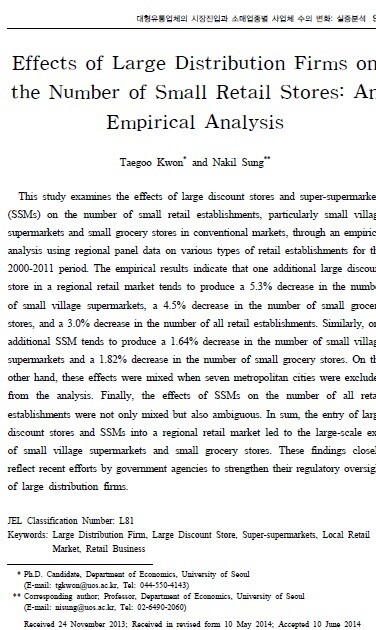hankyoreh
Links to other country sites 다른 나라 사이트 링크
Study quantified damage that SSMs cause to local businesses

By Choi Ik-lim, staff reporter
For every new large discount store that enters a basic administrative unit (city, county, or district), 22 neighborhood supermarkets and 21 small food retailers in the neighborhood go out of business, a study has shown. Analysis also suggested that, for each additional super supermarket (SSM), the number of small supermarkets and small food retailers decreases by 6.84 and 8.09, respectively.
The results were part of a article by Kwon Tae-goo, a Ph.D. candidate at the University of Seoul, and Seong Nak-il, an economics professor at the same university, titled “Effects of Large Distribution Firms on the Number of Small Retail Stores,” which appeared in the June issue of Economic Analysis, a quarterly published by the Bank of Korea.
When large discount stores and SSMs opened between 2000 and 2011, the researchers carried out a regression analysis on cause and effect, with the change in the number of retail outlets for each administrative unit as the dependent variable and population and regional income as the control variables.
Whereas the majority of previous studies on the damage caused by the opening of large discount stores have been limited to specific regions or have depended on questionnaires, this study is notable in that its analysis is based on panel data of companies in various categories of local retailers in cities, counties, and district across the country, spanning about a decade.
The paper found that, for each additional large discount store that opens its doors, the total number of retailers is reduced by 83.3, including 22.03 small supermarkets and 20.1 food retailers, which are associated with traditional markets. These figures correspond to 5.3% of small supermarkets, 4.5% of food retailers, and 3.0% of the total retailers in the area in question.
Large discount outlets and SSMs rapidly expanded into new areas after 2000, the study found. In 2000, large discount stores had been operating in one out of three administrative divisions in the country (29.8%, 49.8% in terms of population). In 2011, they had expanded to 63.2% of these areas (88.5% in terms of population), research showed. Over the same period, the percentage of these areas that SSMs had entered also increased from 24.4% to 74% (or 92.9% in terms of population).
The number of regions with two or more large discount stores (which competed not only with small supermarkets but also with each other) rose from 10.3% in 2000 to 45.5% in 2011.
“This paper confirms that a large number of small supermarkets and food retailers have been driven from the market by the expansion of large discount outlets and SSMs. It was inevitable that the mass closing of these stores would create a backlash from their owners and associated businesspeople, which led to tightening regulations against large discount outlets,” the authors said in the paper.
The research results quantitatively show the extent to which the opening of large discount retailers and SSMs has led to the large scale exit of small retailers, which appears set to intensify the debate between big business and SME advocates over protection measures for neighborhood supermarkets and small businesses.
In response to the paper, SME advocacy groups, which are engaged in a life-or-death struggle to protect neighborhood businesses, decided to convene an emergency meeting of the board of directors of the Korea Supermarket Association (KOSA) in Yeouido, Seoul, on July 9.
“A 2013 survey showed that the number of small neighborhood supermarkets in South Korea had decreased by more than half since 1996, from around 150,000 to less than 70,000. Now that we have statistical data about the actual damage, we are planning to urge the government and politicians to prepare significant, specific measures for small neighborhood businesses and markets, including a revision of the Distribution Industry Development Act,” said Lim Sil-geun, general director of KOSA, in a phone interview with the Hankyoreh.
Please direct questions or comments to [english@hani.co.kr]

Editorial・opinion
![[Column] Season 2 of special prosecutor probe may be coming to Korea soon [Column] Season 2 of special prosecutor probe may be coming to Korea soon](https://flexible.img.hani.co.kr/flexible/normal/500/300/imgdb/original/2024/0426/3317141030699447.jpg) [Column] Season 2 of special prosecutor probe may be coming to Korea soon
[Column] Season 2 of special prosecutor probe may be coming to Korea soon![[Column] Park Geun-hye déjà vu in Yoon Suk-yeol [Column] Park Geun-hye déjà vu in Yoon Suk-yeol](https://flexible.img.hani.co.kr/flexible/normal/500/300/imgdb/original/2024/0424/651713945113788.jpg) [Column] Park Geun-hye déjà vu in Yoon Suk-yeol
[Column] Park Geun-hye déjà vu in Yoon Suk-yeol- [Editorial] New weight of N. Korea’s nuclear threats makes dialogue all the more urgent
- [Guest essay] The real reason Korea’s new right wants to dub Rhee a founding father
- [Column] ‘Choson’: Is it time we start referring to N. Korea in its own terms?
- [Editorial] Japan’s rewriting of history with Korea has gone too far
- [Column] The president’s questionable capacity for dialogue
- [Column] Are chaebol firms just pizza pies for families to divvy up as they please?
- [Column] Has Korea, too, crossed the Rubicon on China?
- [Correspondent’s column] In Japan’s alliance with US, echoes of its past alliances with UK
Most viewed articles
- 1After election rout, Yoon’s left with 3 choices for dealing with the opposition
- 2AI is catching up with humans at a ‘shocking’ rate
- 3Noting shared ‘values,’ Korea hints at passport-free travel with Japan
- 4Why Kim Jong-un is scrapping the term ‘Day of the Sun’ and toning down fanfare for predecessors
- 5Two factors that’ll decide if Korea’s economy keeps on its upward trend
- 6South Korea officially an aged society just 17 years after becoming aging society
- 7Korea’s 1.3% growth in Q1 signals ‘textbook’ return to growth, says government
- 8Is Japan about to snatch control of Line messenger from Korea’s Naver?
- 91 in 5 unwed Korean women want child-free life, study shows
- 10[Reportage] On US campuses, student risk arrest as they call for divestment from Israel